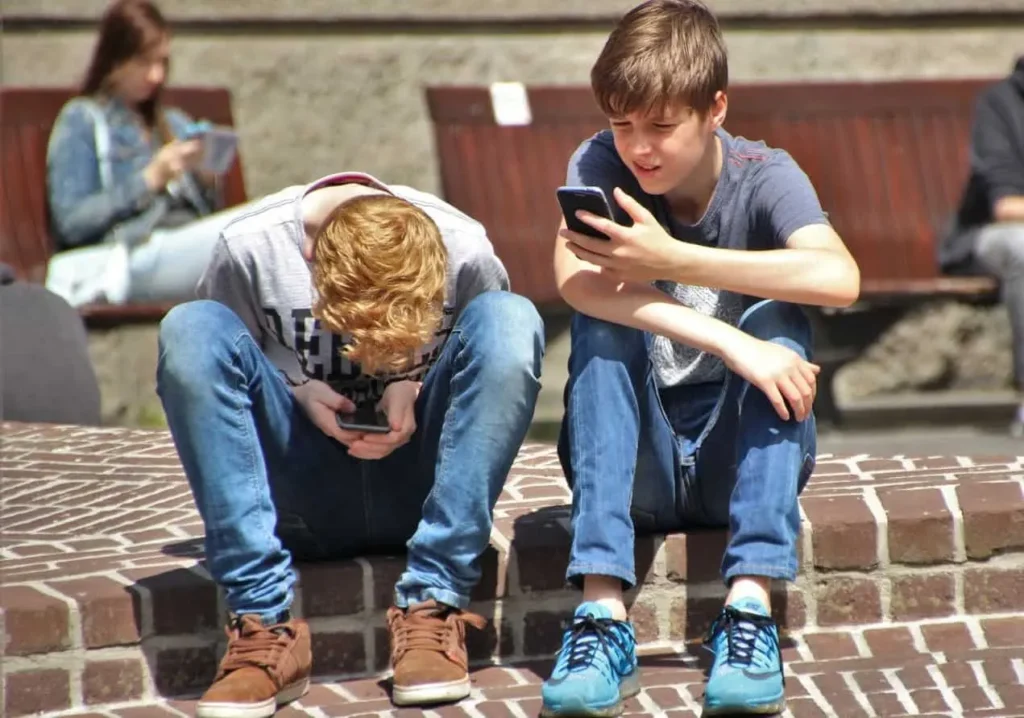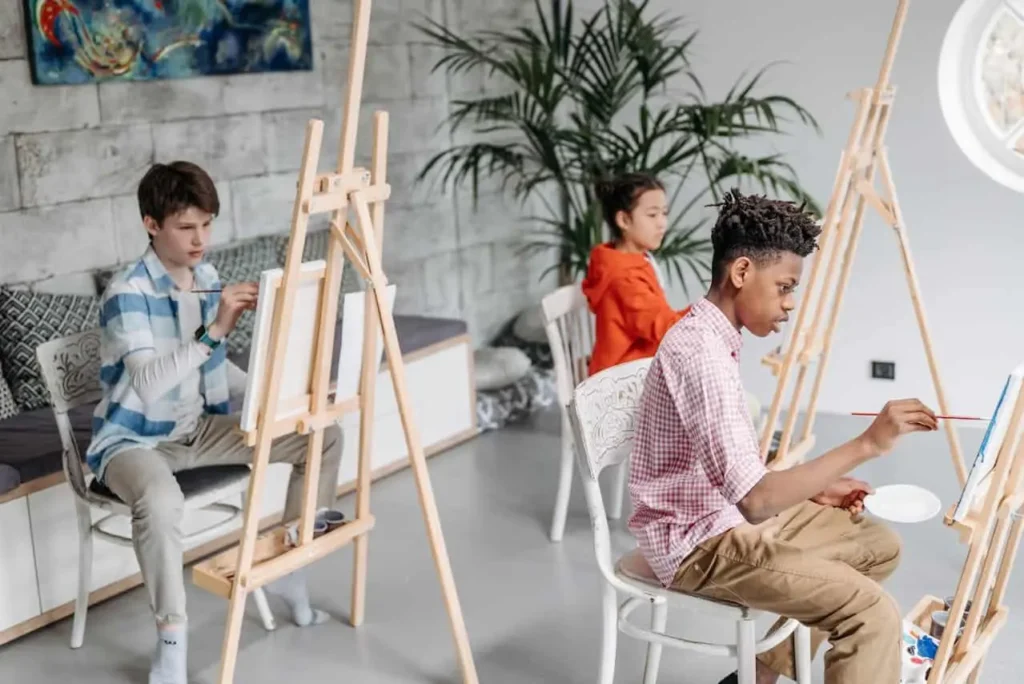The faster the vehicle, the more skill it takes to control it.
The wheel of the world is getting faster and faster. It was not so fast in our time. In the time of our children, it would have been even faster. We have to prepare our kids and teens to compete with this fast-moving world.
Do you think that without the required preparation, our teens and kids will be able to compete and win the life race?
Communication skill is one of the most important skills in life. Here we have brought communication activities for teens to learn this skill.
What do our lives demand of us to turn towards success?
You have to make the necessary preparations to complete the vehicle of your life with the vehicle of the world.
- You have to plan for preparation.
- Then action has to be taken to implement this plan.
- Then this action has to blend continuity and commitment.
- Then you have to bear the difficulties that come in one’s way with a smile.
- You have to say “no” to all your bad friends.
- You have to stay away from all bad associations.
- You have to ignore all the naysayers and demotivators.
Best time in life to learn new skills
Do you know adolescence is a time of life in which a person becomes able to distinguish between good and bad? He also starts to know his profit and loss. He knows how to make the best use of his time. He also starts to see the real face of life more than in childhood.
This is the time when internal energy does not decrease due to small reasons. This is the golden time that can make the next life even more golden.
Are you preparing your teens properly for the life ahead?
Teens navigate through adolescence and prepare for adulthood. Where they have to walk with all the aspects of society. They have to face and experience the real flavors of life.
Are they preparing properly for this?
Are they building the confidence to face the practical face of life?
Are they taking appropriate steps to improve their communication skills?
If not, that’s the place to think. If this time passes, there will never be a better time to learn.
Why Communication Skills Are Important for Teens
Communication skill is a skill that provides the foundation for many other life skills. The lives of a good communicator and a bad communicator will be entirely different. Lack of communication skills forces people to face embarrassment in many different situations in life.
With effective communication skills:
- You can strengthen your personal relationships.
- You can say what you want to say.
- You can convey words to the heart rather than to the ears.
- You can lay the groundwork for academic success.
- You can grab future career opportunities.
Related Article: Social skills for teens: A set of 5 strong skills
Factors Influencing Teen Communication Skills:
The role of parents and family:
A mother’s lap is the child’s first seminary. Parents and family have a profound influence on a child’s communication skills.
Do you know why it is easy?
For the child of a doctor to become a doctor
For the child of an engineer to become an engineer
For the child of a businessman to become a businessman
For the child of a politician to become a politician?
Because he learns by watching. His environment facilitates. He learns a lot without any efforts.
The impact of peers and friends:
Do you remember when your child said something that surprised you and asked him, “Who told you that?” or “Who says that?”
This means that someone other than you and your family has a hand or a role in your child’s learning. Yes, these are peers and friends that have an influential role.
And remember, it can be positive or negative. You have to keep a close eye on it too. According to what the child has said to you, you have to take immediate action accordingly.
The effect of media and technology

The wave of technology in the twenty-first century is definitely affecting the natural qualities of kids and teens. It has both positive and negative effects.
If you are focusing on educating your children at home, and you don’t think about their online activities. If you don’t care what they see or do online, be prepared for the fact that you might suffer too.
- Social media is one of the major reasons for the decline in face-to-face communication.
- Lack of face-to-face communication gives rise to social avoidance.
- Social avoidance destroys the social skills of which communication skills are a part.
Keep a close eye on their online activities. Help them practice in-person communication, not online.
Related Article: 33 Self-care Activities for Teens
17 Focused Communication Activities for Teens
Now we are going to present 17 simple and specifically designed communication activities for teens.
Keep in mind an important thing:
Do not force or compel your kids or teens to perform any activity. But create such an environment that they automatically develop an intrinsic interest and a tendency to perform the activity well. This can multiply your desired results.
Verbal Communication Activities for Teens:
1. Role-playing scenarios
In this activity, teens engage in simulated real-life situations, such as resolving conflicts or negotiating with peers.
Think of an uncomfortable situation you’ve faced in the past.
Create this situation artificially. Examining its various forms. Practice your different reactions. And see how you could have performed better in a particular situation.
This is a very effective communication-enhancing activity.
Teens learn how to express themselves in various scenarios.
They develop problem-solving skills.
empathy and the ability to articulate their thoughts and emotions effectively.
2. Debate clubs or discussions
If you want to remember something verbally, you have to repeat it many times. You can’t read it right even after seeing it for the first time. But then there comes a time when it goes on your tongue unconsciously.
When teens participate in structured debates or discussions on topics of interest. Do you know in which aspects they improve automatically?
Participating in debates or discussions does not have the only benefit that we are thinking of. Rather, unconsciously in the background, many of our other life skills are improving.
This activity fosters critical thinking, active listening, and the ability to present coherent arguments while respecting opposing viewpoints.
3. Storytelling sessions
Stories capture attention and make information more memorable. Stories evoke emotions. Storytelling helps teens break down complex concepts or ideas into simpler, more relatable narratives.
Encourage teens to share personal stories or narratives with their peers.
Through storytelling, teens learn to organize their thoughts, convey emotions, and engage their audience. Thus, they improve their narrative and communication skills.
Read more about this activity.
4. Public speaking exercises

Public speaking greatly improves confidence—one of the main pillars of communication skills for teens.
Do not compel them to speak in public.
Start with small steps. Inject miner things unnoticeably into their routine.
Encourage them to speak on a simple topic, first in front of you and then your family. Do not be harsh at all. If they agree to speak in front of you, avoid finding mistakes at all.
Whatever and however they speak, your feedback should be filled with praise and appreciation. When they gradually start building confidence, correct their mistakes and move toward speaking in front of an audience, taking small steps forward.
Provide your teens with the opportunity to practice delivering speeches or presentations in front of an audience.
Read more about this activity.
This activity builds confidence, enhances verbal articulation, and hones presentation skills, crucial for effective communication.
Related Article: Conflict resolution for teens (Practical Tips)
Nonverbal Communication Activities for Teens:
5. Body language games
Actions speak louder than words. When your mannerisms match your words, an impact is created within the speech, and the speech makes its way from the ears to the heart.
You have often heard that “someone is very good at acting.” Acting is not about talking; it’s about the way you talk.
Body language depends on non-verbal cues. Engage teens in games and activities like Mirror Game, Body Language Freeze, Emotion Charades, Body Language Detective that focus on interpreting and using body language effectively.
By becoming more aware of nonverbal cues and gestures, teens learn to communicate more confidently and understand others’ emotions and intentions better.
6. Expressive arts workshops

Expressive arts workshops are like fun classes where teens get to try out things like acting in plays or dancing. In these workshops, they can express themselves in lots of different ways.
When teens join in, they learn to understand how others feel, get more creative, and figure out how to show their feelings without using words. This is super important because it helps them become better at talking with others and getting along well in nonverbal communication.
7. Mirror exercises
Mirror exercises are important communication activities for teens. In these exercises, teens pair up with someone and take turns being the leader and the follower. The leader moves their body, making gestures or facial expressions, and the follower copies them. Then they switch roles.
This helps teenagers get better at understanding other people’s body language and how they feel. Plus, it’s a fun way to be a good communicator.
8. Eye contact practice
Here are four simple activities for teens to practice eye contact:
- Eye Contact Challenge: Pair up and take turns looking into each other’s eyes for short periods, gradually increasing the time without looking away.
- Storytelling Circle: Sit in a circle and tell short stories while making eye contact with others in the group
- Role-Play Interviews: Pretend to have interviews with each other, focusing on maintaining eye contact while speaking or listening.
- Eye Contact Game: Create a game where you earn points for making eye contact in everyday situations, like talking to friends or family.
These activities make practicing eye contact fun and help you get better at it!
9. Gestures and facial expression exercises
When you see something happening before your eyes, it becomes easier to understand and do it. When you watch short video clips or movie scenes without sound. So you get to know what kind of message is conveyed by what kind of gesture or what meaning is hidden in what kind of expression.
Choose a short story or anecdote. Practice telling it with facial expressions and gestures.
Assign different scenarios as role-play to your teens (e.g., meeting a friend, receiving good news, apologizing). Practice acting out each scenario using appropriate gestures and facial expressions.
You have to provide your children with an environment that is interesting and motivating to perform. It is not necessary to be strict. Being harsh or coercive for no reason creates an atmosphere of avoidance and rebellion in the minds of children.
Related Article: 11 Exciting Leadership Activities for Teens
Written Communication Activities for teens:
10. Journaling prompts
When you see something through your eyes, it becomes easier for you to understand, analyze and adapt it to your personality.
Writing in a journal helps teens put their thoughts and feelings into words. It’s like talking to themselves on paper. It can make their thoughts clearer, help them understand themselves better, and make them better at writing, which is important for communicating well in writing.
Provide writing prompts to encourage teens to express their thoughts and feelings in writing. Journaling helps teens clarify their thoughts, improve self-expression, and develop their writing skills, which are essential for effective written communication.
11. Pen-pal exchanges
Facilitate pen-pal exchanges with peers from different backgrounds. Through written correspondence, teens practice communicating ideas, sharing experiences, and developing empathy and understanding of diverse perspectives.
12. Collaborative writing projects
Assign group writing projects that require collaboration and effective communication. By working together to brainstorm, plan, and revise written content, teens learn to communicate ideas effectively and appreciate the value of teamwork in achieving common goals.
13. Blogging or vlogging
Encourage teens to start their own blogs or vlogs to share their perspectives and experiences with a wider audience. This activity allows them to hone their writing or video production skills, express themselves creatively, and engage with others in meaningful online communication.
14. Creative writing contests or workshops
Some thoughts are very complex. It is difficult for us to analyze them as such. When we take them out of our minds and put them on paper in front of our eyes, it becomes a lot easier to control.
Organize contests or workshops to nurture teens’ creativity and writing skills. By participating in writing activities that challenge their imagination and storytelling abilities, teens develop confidence, fluency, and proficiency in written communication.
Related Article: Conflict Resolution Worksheets For Teens
Listening and Empathy-Building Activities for Teens
15. Active listening exercises
Teach teens active listening techniques, such as paraphrasing and reflecting. Through active listening, teens learn to pay attention, understand others’ perspectives, and respond empathetically, thereby strengthening their interpersonal communication skills.
16. Empathy-building games
Play games that promote empathy and understanding of others’ emotions and experiences. Through interactive activities that encourage perspective-taking and emotional awareness, teens develop empathy, compassion, and effective communication skills in diverse social contexts.
17. Volunteer activities or community service projects
Engage teens in volunteer work to cultivate empathy and communication skills while making a positive impact on their community. By participating in meaningful service projects, teens learn to collaborate, communicate effectively, and empathize with others, fostering a sense of social responsibility and civic engagement.
These activities provide teens with diverse opportunities to develop and enhance their communication skills in various contexts, fostering confidence, empathy, and effective interpersonal connections.
Tips for Maximizing the Effectiveness of Communication Activities for teens
It is natural that human nature wants ease. And get tired of boring things. What the heart likes easily falls into the heart. And what is disliked after some time begins to develop a tendency to quit.
Related Article: Goal Setting for Teens: A Complete Blueprint for Success
If you want to get the most out of these communication activities for teens, consider the following important points:
- Provide a focused and supportive environment for the specific activity your teen is going to perform.
- Start with very small steps. For example, instead of speaking in front of large audiences, encourage your children to speak first in front of you and then in front of your family and then so on.
- At the beginning, avoid inhibition or judgment while performing any communication activity.
- As the confidence level increases, level up the communication skills and compliments all the way to the destination.
- In the beginning, even if there is a mistake, avoid interruption. But then slowly start correcting the child along with his or her confidence level.
- In this way, slowly bring the teen onto the desired track. He will start feeling happy. The level of confidence will also start increasing. Many other qualities will also start to arise automatically. This is where personality-grooming starts. And after this practice, learning any new skill will not be difficult any more.
Encouraging Teen Engagement in Communication Activities
The learning process will only continue if your commitment and your teen’s engagement go hand in hand. And the destination will keep getting closer. But if there is a lapse in your commitment or your teen’s engagement, the learning process and commitment will falter from that moment on.
An important thing to remember is not to be rigid at all during the learning process.
You have to take care of their interests and value their choices.
During the learning process, suppress your harshness and cultivate your gentleness towards your children. It awakens creativity and increases brain capacity and capability to work.
Give your teen the freedom to choose communication activities according to their passions and interests. For example, if they like music, incorporate music-related activities into their routine.
With the positive use of technology, we can add color to the picture of our lives. You must also add technology as needed, for instance, to create interactive presentations, use social media for discussions, or incorporate multimedia elements into projects.
Conclusion
Communication skills are great life skills for teens. There can be many ways to learn this skill. Each method may be different from the other. And different methods match different natures. Different activities suit different personalities.
Within this article, we have presented, in a very simple way, research-backed seventeen activities that suit people of different natures. Through these activities, you can easily and effectively take your teen’s communication skills to the next level.
Through these diverse communication activities, teens can enhance their verbal, nonverbal, and written communication skills.
These communication activities for teens not only enhance communication skills but also lead to many positive changes associated with them within the personality. Which enables young adults to face the challenges that life brings and embark on the path of success.

2 thoughts on “17 Specially Designed Communication Activities for Teens in 2024”
Comments are closed.